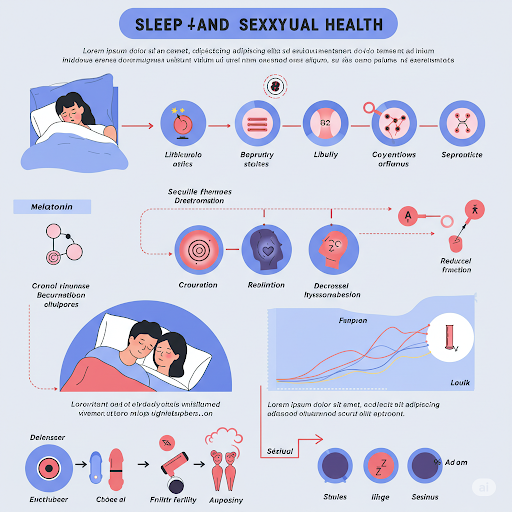The Overlooked Connection Between Sleep and Sex
When we think about the pillars of good health, we often mention diet and exercise — but sleep is just as critical, especially when it comes to sexual well-being. A consistent lack of sleep doesn’t just leave you feeling tired; it can significantly disrupt hormonal balance, blood flow, and even your psychological readiness for intimacy.
For men, this means that poor sleep habits can contribute directly to erectile dysfunction (ED), low libido, and reduced performance. Let’s explore how sleep affects your sexual health and what you can do to improve both.
How Sleep Regulates Testosterone Levels
Testosterone is the primary male sex hormone and plays a central role in libido, energy, muscle mass, and erectile function. The majority of testosterone production occurs during deep sleep. When sleep is restricted or fragmented, testosterone levels may drop significantly — and with them, sexual desire and performance.
One study from the University of Chicago showed that men who slept only 5 hours per night for one week had a 10–15% drop in testosterone levels. That’s a sharp decline for such a short time frame.
Signs Your Testosterone May Be Affected by Sleep:
- Lower morning erections
- Decreased sex drive
- Mood swings or irritability
- Loss of muscle mass or strength
- Fatigue despite resting
The Role of Sleep in Erectile Function
Erections are a complex process that depends on healthy blood flow, neural communication, and psychological readiness. Sleep is closely tied to all three.
During sleep:
- The body restores its vascular function, helping arteries and veins maintain elasticity and performance.
- REM sleep (dreaming stage) promotes nocturnal penile tumescence — spontaneous erections during sleep — which are a natural part of male health.
- Quality rest reduces cortisol, a stress hormone that can interfere with testosterone and cause blood vessel constriction.
Poor sleep can lead to:
- Decreased nitric oxide levels (essential for vasodilation and erection)
- Weakened blood vessel function
- Increased anxiety and stress
- Reduced sexual satisfaction and confidence
Sleep Disorders That Affect Sexual Health
Several sleep disorders are directly linked to erectile dysfunction and low libido:
1. Obstructive Sleep Apnea (OSA)
Men with sleep apnea often suffer from oxygen deprivation during the night, leading to increased inflammation, heart stress, and lower testosterone. Studies have shown that up to 70% of men with sleep apnea also report ED.
2. Insomnia
Difficulty falling or staying asleep affects hormone regulation and mental health, both of which are essential for a healthy sex life.
3. Restless Leg Syndrome (RLS)
Linked to dopaminergic dysfunction, RLS may also have a connection with reduced libido and ED in men.
How Much Sleep Do You Need for Optimal Sexual Health?
Most adult men need 7 to 9 hours of quality sleep per night. But quantity isn’t the only thing that matters — sleep quality is just as important. Deep, uninterrupted sleep allows your body to complete all its hormonal and neurological cycles.
Here’s how you can improve both:
Tips to Improve Sleep and Boost Sexual Function
1. Stick to a Sleep Schedule
Go to bed and wake up at the same time every day, even on weekends. This helps regulate your circadian rhythm, which affects testosterone and other hormones.
2. Create a Sleep-Friendly Environment
- Keep your bedroom dark, quiet, and cool
- Use blackout curtains
- Avoid screens (phones, laptops, TVs) at least 1 hour before bedtime
3. Avoid Caffeine and Heavy Meals at Night
Both can interfere with your ability to fall asleep and get deep, restful sleep.
4. Limit Alcohol and Nicotine
Though alcohol may initially make you drowsy, it disrupts REM sleep and overall quality. Nicotine is a stimulant that can make it harder to fall asleep.
5. Exercise Regularly — But Not Too Late
Physical activity improves sleep quality, but intense workouts too close to bedtime can increase alertness.
6. Practice Stress-Reduction Techniques
Meditation, journaling, and breathing exercises before bed can help calm the mind and prepare the body for restorative sleep.
Sleep, Mood, and Desire: A Three-Way Connection
Lack of sleep doesn’t just affect the physical aspects of sex — it impacts emotional intimacy and desire too. Sleep-deprived individuals often experience:
- Mood swings
- Reduced patience and emotional connection
- Less spontaneous sexual interest
- Decreased confidence in performance
Improving sleep hygiene can enhance your mental clarity and emotional availability, which naturally contributes to a better sex life.
When to Seek Help
If you’ve made consistent efforts to improve your sleep but still struggle with fatigue, low libido, or erectile dysfunction, it may be time to talk to a healthcare provider. You could be dealing with a sleep disorder or hormonal imbalance that needs medical intervention.
Rest Well, Perform Better
Sleep is the hidden engine behind a man’s sexual health. Prioritizing rest not only helps you feel more energized but also promotes better hormone production, sharper mental focus, and more fulfilling intimacy. By fixing your sleep habits, you’re investing in every area of your well-being — and your bedroom will thank you.
